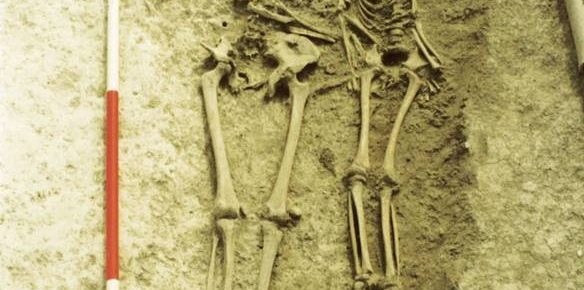
The village of Barrington, in Cambridgeshire, presents the viewer with a quintessentially English rural scene: with its thatched cottages and village pub, and one of the best-preserved and extensive village greens in the country, it could not feel further removed in space or time from the Mediterranean world in the ‘Age of Justinian’. Yet this village and its environs have revealed startling evidence for the external crises that convulsed the Mediterranean world at the end of antiquity, and which clearly even reverberated as far afield as this picturesque corner of England. For near the village, at a site known as Edix Hill, archaeologists have excavated an early Anglo-Saxon burial site which would appear to go back to the middle years of the sixth century AD. Crucially, two years ago, study of the DNA preserved in the skeletal remains found there revealed that two of those interred (comprising a mother and child buried arm-in-arm in the same grave) had died carrying bubonic plague, a plague which literary sources reveal had first arrived in the Mediterranean, via the Red Sea, in the year 541, and which clearly spread beyond the ‘East Roman’ (or ‘Byzantine’) empire of Justinian (r.527-65) with remarkable rapidity.
According to a number of contemporary eye-witness accounts (including one by the great Greek historian Procopius, who was present when the plague first arrived in Constantinople), within the Mediterranean world the advent of the bubonic plague caused a tsunami of human misery, and posed major problems to the Emperor Justinian, who was at that point engaged in the re-conquest of Italy to the West and warfare with Persia to the East. Within the imperial capital, Procopius describes over ten thousand victims a day succumbing to the disease (an estimate that is largely consistent with the sort of mortality rates associated with later but related bubonic outbreaks). Justinian was obliged to respond with emergency legislation trying to impose price and wage controls, making it easier for people to make wills, and trying to prop up the empire’s ‘banking sector’. The plague also served to intensify apocalyptic expectations on the part of many of the emperor’s subjects, and led Justinian to crack down on pagans, heretics and others held responsible for the divine displeasure that had descended on his realm.
Importantly, a sudden loss of taxpayers and military manpower exacerbated the empire’s existing fiscal and logistical problems, and would contribute to growing military and political instability in the late sixth century. The sixth-century plague sapped the empire’s strength, thereby facilitating its seventh-century collapse, when it would lose control of Syria, Palestine, and Egypt initially to the Persians, and then to the Arabs, united by the nascent faith of Islam. The plague tended to advantage less hierarchical and less urbanized societies over their more hierarchical and urbanized imperial foes, which were more structurally vulnerable and thus prone to collapse. It also had the effect of breaking down and disrupting ties of commerce and exchange between regions. Up until the middle years of the sixth century, for example, Justinian’s empire had maintained commercial contact with communities in western Britain, seemingly exchanging imperial gold for tin. In the second half of the century, these connections appear to have broken down, facilitating Anglo-Saxon expansion as Roman-British resistance collapsed. What role such commercial ties played in the initial arrival of the plague in England is currently unclear, but the way in which the ‘Justinianic Plague’ served to fragment globalized networks of trade, and exacerbated and tested existing structural weaknesses within the most complex late antique societies, may resonate with our own experience today.
Latest Comments
Have your say!